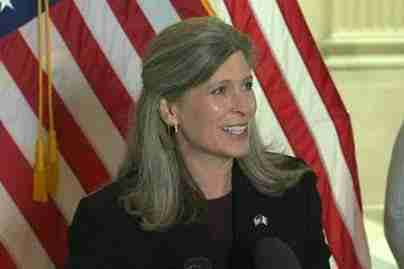Iowa Ag Groups, Top Senators Now Backing Ernst’s Push to Lift Shipping Restrictions, Expedite Food Aid Amid Russia’s War
Ernst’s bipartisan measure is gaining strong, bipartisan support.

U.S. Senator Joni Ernst (R-Iowa), a member of the Senate Agriculture Committee and one of the leading voices sounding the alarm about an emerging food crisis resulting from Russia’s lawless war on Ukraine, is gaining major, bipartisan support from Iowa and national agricultural groups as well as many of the top leadership members in the U.S. Senate for her push to lift bureaucratic shipping restrictions in order for the U.S. to expedite food aid right away.
The Iowa Farm Bureau, the Iowa Soybean Association, the American Soybean Association, and the National Corn Growers Association are supporting Ernst’s resolution.
In addition, Ernst’s resolution—which she introduced with Senator Chris Coons (D-Del.), the chairman of the Senate Appropriations Subcommittee on State, Foreign Operations, and related programs—now has the support of the following senators, many of whom hold top leadership positions:
- Senator Mitch McConnell (R-Ky.), the Republican Leader of the Senate
- Senator Dick Durbin (D-Ill.), the Democratic Whip and the chairman of the Senate Judiciary Committee
- Senator Chuck Grassley (R-Iowa), the ranking member of the Senate Judiciary Committee
- Senator Jim Risch (R-Idaho), the ranking member of the Senate Foreign Relations Committee
- Senator Patrick Leahy (D-Vt.), the chairman of the Senate Appropriations Committee
- Senator Thom Tillis (R-N.C.), co-chair of the Senate NATO Observer Group
- Senator James Lankford (R-Okla.), the ranking member of the Senate Subcommittee on Regulatory Affairs and Federal Management
“The world is witnessing an emerging food crisis as a direct result of Putin’s lawless assault against Ukraine; Russia is engaging in a ‘food war,’” said Senator Joni Ernst. “Iowan and American farmers are ready to step in and help, but bureaucratic red tape is putting an enormous restriction on our shipping capacity that is actually increasing costs to the taxpayer while further delaying the vital delivery of food aid at a time when speed it critical. I’m proud and encouraged to see growing, strong, and bipartisan support for this temporary cargo wavier from some of the most important agriculture groups in Iowa and the nation as well as from so many of my colleagues from across the aisle in the Senate. The need to act—and quickly—has never been clearer.”
The Iowa Farm Bureau stated, “The Iowa Farm Bureau is supportive of this effort to reform provisions that limit our ability to feed the world, and we appreciate Senator Ernst’s leadership.”
Robb Ewoldt, Iowa Soybean Association president and soybean farmer near Davenport, said, “The cargo preference requirement has long been criticized for driving shipping costs far beyond the value of food commodities onboard vessels. To Iowa soybean farmers, this is unacceptable. The state’s soybean growers work year-round to ensure the increasing global demand for soy used for the food, fiber and fuel is met. Coming off a record soybean harvest in 2021 (622 million bushels), growers continue to play a leading role in addressing global food insecurity. However, ensuring Iowa soybeans reach the people who need them in an efficient, cost-effective way must be a priority. We thank Sen. Ernst for her leadership in bringing this issue before the U.S. Senate, as well as the bipartisan coalition of lawmakers needed to move this waiver forward. Iowa soybean farmers look forward to the waivers’ swift implementation through this Concurrent Resolution.”

Background:
Current law mandates 50 percent of U.S. food aid exports to be shipped on U.S. flagged vessels, a rule that increased shipping costs by an average of $52.6 million per fiscal year between 2013 and 2018 (on average). U.S. Secretary of Agriculture Tom Vilsack said that the cost of shipping the food commodities overseas is often higher than the actual costs for the grain and other products themselves right now.
Astonishingly, there are only four dry-bulk shipping vessels—the preferred means for moving large commodities, including food aid—worldwide that meet these shipping requirements while there are more than 12,000 vessels operating globally, according to USDA. The total U.S. flagged ships make up less than one percent of the global shipping fleet. Under current law, the President of the United States, Secretary of Defense, or Congress can waive the 50 percent requirement temporarily. Ernst’s bipartisan measure temporarily waives the requirement.
Ernst, along with fellow member of the Senate Agriculture Committee, U.S. Senator Roger Marshall (R-Kan.), hosted members of Ukrainian civil society for a discussion about Russia’s war in Ukraine and what it means for global food security and agriculture. Ernst also penned an op-ed in FoxNews.com entitled, “Ukraine must win the war Putin is waging and Biden needs to step up.”




